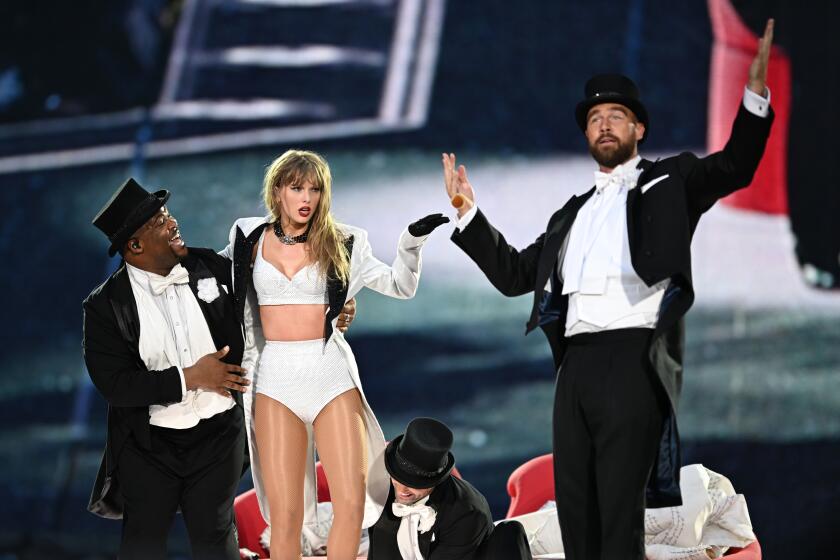Denise Rich Is Not a Starving Songwriter, but She Does Write
There’s something about Denise Rich--her lavish parties, her abundant philanthropy and political contributions and, most prominently, the controversial pardon granted her ex-husband--that makes people think her songwriting is some sort of hobby.
Aren’t songwriters usually starving-artist types, begging to be discovered?
For the record:
12:00 a.m. March 16, 2001 For the Record
Los Angeles Times Friday March 16, 2001 Home Edition Calendar Part F Page 2 Entertainment Desk 1 inches; 26 words Type of Material: Correction
Oscar nomination--A story in Wednesday’s Calendar about songwriter Denise Rich mistakenly reported that her song “Free Yourself” had been nominated for an Academy Award. It was not.
But despite her considerable financial and political baggage, Rich has been one of the most active songwriters of the last decade, with Oscar and multiple Grammy nominations, and work appearing on platinum albums by Celine Dion, Marc Anthony and Mandy Moore.
It’s still to be determined whether the considerable contributions to Democrats by Rich, 57, played a role in getting presidential clemency for Marc Rich, her billionaire former husband who has lived in Switzerland since just before he was indicted in 1983 on charges of tax evasion, fraud and making illegal oil deals with Iran.
But there is no doubt that Denise Rich made some contributions to the pop world, including co-writing Moore’s breakthrough hit “Candy” and the track “I Like It” on the teen star’s debut album.
She was born Denise Eisenberg in Worcester, Mass. Her parents, Holocaust survivors, had fled Berlin, where they ran a family fur business, to begin a successful shoe factory in Massachusetts.
Denise Rich learned guitar as a teenager and, according to her official Web site, “‘wrote her first songs in a bathroom with an acoustic guitar after reading about the American Song Festival.”
In an odd way, Marc Rich had a lot to do with her eventual career as a songwriter. They married in 1966; her father loaned her new husband money for his first business. As he became a high-stakes financier and was beginning to get the attention of authorities, he fled the country. Soon she chased after him with their daughters.
It was in Switzerland that Denise Rich returned to songwriting, as a way to communicate with her husband, she told New York magazine in 1999. “Like, when I would fight with him, I would get so emotional. Because he was all about business. And I was about, you know, feelings and love. I had a hard time putting my feelings into words. So I put them into songs.”
She was lucky enough to find success with one of her first efforts. “Frankie,” a jaunty ditty that was recorded by Sister Sledge, topped the charts in a number of countries, although it only reached No. 75 in the United States, where it was Sister Sledge’s last charting hit in 1985.
By then her husband was in exile, and she was determined to keep him, despite reports he had a German mistress. Returning to New York and trying to repair her tattered socialite image, she began writing in earnest, often producing songs that could be interpreted as having to do with her troubled relationship.
“Free Yourself,” as sung by Chaka Khan, appeared on the soundtrack to the 1995 film “To Wong Foo, Thanks for Everything, Julie Newmar,” where it earned an Oscar nomination for song of the year (won by “Colors of the Wind” from “Pocahontas”).
It was because of Rich’s socializing and lavish parties that her song “Love Is On the Way” was used in Bette Midler’s 1996 movie “The First Wives Club.” Midler heard it at a party.
Mostly, Rich found success--surprising, considering her background--in the R&B; field, where her songs were recorded by Kool & the Gang, Kashif, Brenda K. Starr, Melissa Morgan and Brenda Russell, Sibyl, Robin S., Jody Watley and CeCe Peniston.
Patti LaBelle, who recorded Rich’s songs “I’m Addicted to You” and “Love Is Just a Whisper Away” on her 1988 Grammy-nominated “Blaze,” once described Denise Rich as “a white woman with a black woman inside her screaming to get out.”
Indeed, Rich’s “All I Wanna Be Is Understood,” written while she was still in Switzerland, became the theme song for the National Civil Rights Museum in Memphis, Tenn., and was nominated for a gospel Grammy when it was recorded by Termaine Hawkins in 1994.
Denise Rich has also worked with a host of other songwriters; she collaborated with Burt Bacharach on the municipal theme song “New York, It Ain’t Over.”
She had a stab at a solo album early in her career, on a 1987 album released only in Europe. But in the mid-’90s, artists from Englebert Humperdink and Nana Mouskouri to Johnny Mathis and Grover Washington Jr. recorded more and more of her songs.
She landed on the biggest-selling album of her career when two songs she co-wrote, “Love Is on the Way” and “Amar, Haciendo El Amor,” were included on Celine Dion’s multi-platinum “Let’s Talk About Love”--the one that also included the theme from “Titanic,” “My Heart Will Go On.”
Other recent multi-platinum placements for her songs came on teen star Mandy Moore’s debut and Marc Anthony’s self-titled 1999 English debut.
She’s also continued to place songs in films. The duet she co-wrote for Kelly Price and Aaron Hall, “Love Sets You Free,” landed on “The Hurricane” soundtrack. Her song “You’re the Only One for Me” by Allure appeared on the “Runaway Bride” soundtrack.
Rich’s most recent Grammy nomination came when she helped write “Don’t Waste Your Time” as sung by Aretha Franklin and Mary J. Blige for the latter’s “Mary” album in 1999.
“It’s about any woman who’s been in a relationship,” Denise Rich told Billboard just before last year’s Grammys.
Not necessarily a woman, one imagines, who had just extracted herself from a marriage with a man who’s been called the biggest white-collar criminal in U.S. history.
Rich’s recent spot in the news hasn’t stopped her music career. Just last week, she appeared at a New Jersey radio station with Natalie Cole, helping to promote a single they co-wrote, “Livin’ for Love,” which first appeared on Cole’s greatest-hits album in November.
What’s next for Denise Rich’s songbook? Will it be in demand for recording by the same people who, say, rushed to record Charles Manson songs, for the novelty of it all?
Or will this notoriety at last bring her own performing career into the spotlight, getting her the kind of bookings Gennifer Flowers once enjoyed?
Nobody is saying. But for now, Denise Rich has made it clear there’s one place she won’t be singing: before Congress.
More to Read
The biggest entertainment stories
Get our big stories about Hollywood, film, television, music, arts, culture and more right in your inbox as soon as they publish.
You may occasionally receive promotional content from the Los Angeles Times.






